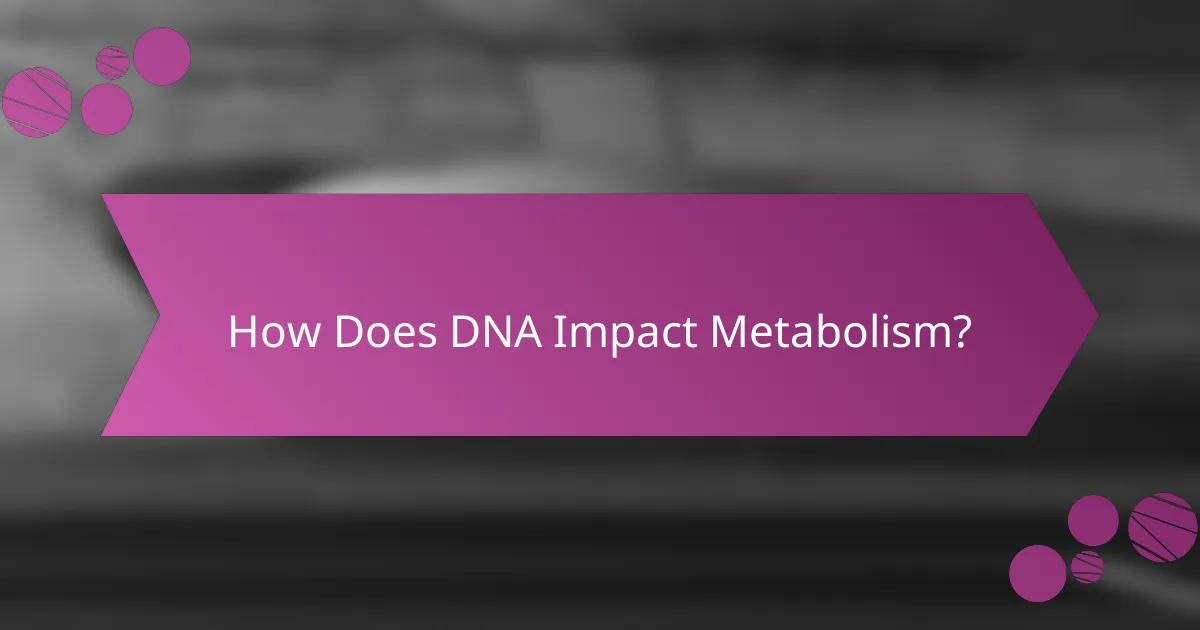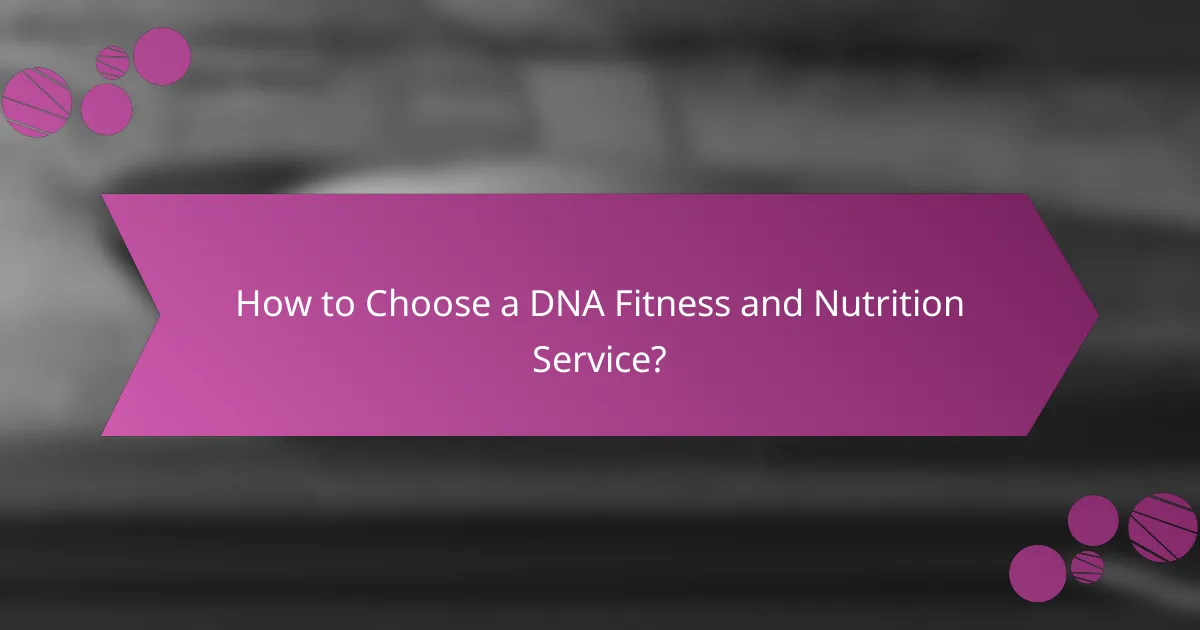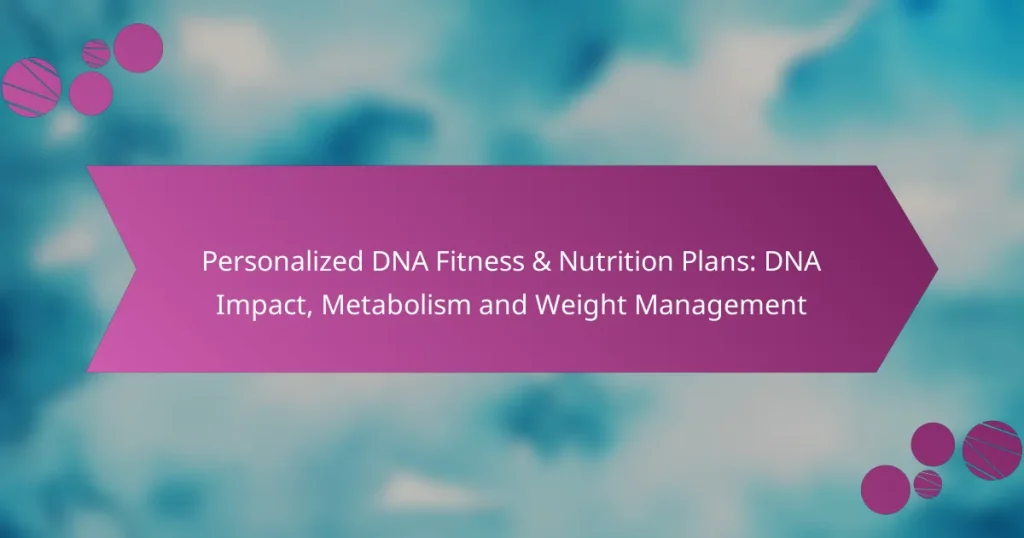Personalized DNA fitness and nutrition plans utilize genetic insights to tailor strategies that enhance individual health and performance. By examining your DNA, these plans can optimize workouts and dietary choices, taking into account your unique metabolic profile and nutritional needs. This approach not only supports effective weight management but also promotes overall wellness by aligning fitness and nutrition with your genetic predispositions.

How Do Personalized DNA Fitness Plans Work?
Personalized DNA fitness plans leverage genetic information to create customized fitness and nutrition strategies. By analyzing an individual’s DNA, these plans can optimize workouts, dietary choices, and recovery methods based on genetic predispositions.
Genetic analysis for fitness
Genetic analysis for fitness involves examining specific genes that influence metabolism, muscle composition, and exercise response. This analysis typically identifies variations that can affect how your body reacts to different types of physical activity and nutrition.
Common genetic markers include those related to endurance, strength, and fat storage. Understanding these markers helps in tailoring a fitness approach that aligns with your genetic strengths and weaknesses, maximizing effectiveness.
Tailored workout recommendations
Based on genetic insights, tailored workout recommendations are designed to suit individual capabilities and preferences. For instance, if your analysis indicates a predisposition for endurance, your plan may emphasize longer, steady-state cardio sessions.
Conversely, if strength training is your genetic forte, the plan might focus on high-intensity resistance workouts. This personalized approach can enhance motivation and adherence to the fitness regimen.
DNA-based recovery strategies
DNA-based recovery strategies utilize genetic information to inform optimal recovery practices. Certain genetic markers can indicate how quickly you recover from exercise and your susceptibility to injuries.
For example, if your genetic profile suggests a slower recovery rate, your plan may incorporate more rest days or specific recovery techniques like active recovery sessions or targeted stretching routines. This ensures that your body heals effectively, reducing the risk of overtraining.
Real-time progress tracking
Real-time progress tracking is essential for assessing the effectiveness of personalized DNA fitness plans. Using wearable technology or fitness apps, individuals can monitor their workouts, nutrition, and recovery metrics continuously.
Regularly tracking progress allows for adjustments to the plan based on performance and recovery feedback. This dynamic approach ensures that the fitness strategy remains aligned with your evolving needs and goals, enhancing overall results.

What Are the Benefits of DNA Nutrition Plans?
DNA nutrition plans offer personalized dietary strategies based on genetic insights, leading to improved health outcomes. By understanding how your DNA influences metabolism and nutrient needs, these plans can enhance overall wellness and support effective weight management.
Customized dietary recommendations
Customized dietary recommendations are tailored to your unique genetic profile, allowing for more effective nutrition strategies. For example, individuals with specific genetic markers may benefit from higher protein intake or increased omega-3 fatty acids. This personalization helps in selecting foods that align with your body’s needs, potentially improving energy levels and overall health.
To create an effective plan, consider working with a nutritionist who can interpret your genetic data and suggest meal plans that fit your lifestyle. Regularly revisiting and adjusting these recommendations can ensure they remain aligned with your evolving health goals.
Enhanced nutrient absorption
Enhanced nutrient absorption is another significant benefit of DNA nutrition plans. Genetic variations can affect how well your body absorbs certain vitamins and minerals, such as vitamin D or calcium. By identifying these variations, you can focus on foods and supplements that optimize nutrient uptake.
For instance, if your genetic profile indicates a lower absorption rate for iron, incorporating iron-rich foods like spinach or legumes, along with vitamin C sources to boost absorption, can be beneficial. Monitoring your nutrient levels through regular blood tests can help refine your approach.
Improved weight management
Improved weight management is achievable through DNA nutrition plans that align dietary choices with your metabolic profile. Understanding how your body processes carbohydrates, fats, and proteins can guide you in making better food choices that promote a healthy weight. For example, some individuals may find low-carb diets more effective, while others thrive on balanced macronutrient intake.
To support weight management, consider tracking your food intake and physical activity. This data can help identify patterns and inform adjustments to your diet. Additionally, combining your DNA insights with regular exercise can enhance your weight management efforts, leading to sustainable results.

How Does DNA Impact Metabolism?
DNA significantly influences metabolism by determining how efficiently your body converts food into energy. Genetic variations can affect metabolic pathways, leading to differences in energy expenditure, fat storage, and overall weight management.
Genetic factors influencing metabolism
Several genetic factors play a crucial role in metabolism, including variations in genes related to enzymes and hormones that regulate energy balance. For instance, polymorphisms in the FTO gene have been linked to obesity and metabolic rate differences. Understanding these genetic influences can help tailor nutrition and fitness plans to individual needs.
Additionally, genes that affect muscle composition and fat distribution can impact how your body utilizes energy. Those with a genetic predisposition for higher muscle mass may have a naturally higher metabolic rate, allowing them to burn calories more efficiently.
Metabolic rate variations
Metabolic rates can vary widely among individuals due to genetic factors, lifestyle, and age. Generally, basal metabolic rate (BMR) accounts for a significant portion of daily energy expenditure, and genetics can influence BMR by 10-20%. For example, individuals with a higher BMR may find it easier to maintain or lose weight compared to those with a lower BMR.
To assess your metabolic rate, consider factors like age, sex, and activity level. Tools such as indirect calorimetry can provide precise measurements, while online calculators can offer estimates based on personal data.
Impact on fat storage
Genetic predispositions can affect how and where fat is stored in the body. Certain genes may lead to an increased likelihood of storing fat in the abdominal area, which is associated with higher health risks. Conversely, others may promote subcutaneous fat storage, which is generally considered less harmful.
Understanding your genetic profile can help in creating a personalized nutrition plan that minimizes fat storage. For instance, individuals prone to abdominal fat may benefit from a diet lower in refined carbohydrates and higher in fiber, which can help regulate insulin levels and promote fat loss.

What Role Does DNA Play in Weight Management?
DNA significantly influences weight management by determining how our bodies metabolize nutrients, respond to exercise, and manage hunger. Genetic variations can affect metabolism rates, fat storage, and even the likelihood of gaining weight, making personalized approaches to nutrition and fitness essential.
Personalized weight loss strategies
Personalized weight loss strategies take into account individual genetic factors that influence metabolism and dietary responses. For instance, some people may benefit from a higher protein intake, while others may thrive on a low-carb diet. Utilizing DNA analysis can help tailor these strategies to maximize effectiveness and sustainability.
To create a personalized plan, consider factors such as your genetic predisposition to store fat or your body’s efficiency in burning calories. Consulting with a nutritionist who understands genetic influences can provide valuable insights and practical steps for weight loss.
Understanding hunger cues
Understanding hunger cues is crucial for effective weight management. Genetics can play a role in how we perceive hunger and satiety, influencing our eating behaviors. Some individuals may have a heightened sensitivity to hunger signals, while others may struggle to recognize when they are full.
To better manage hunger, focus on mindful eating practices. This includes paying attention to your body’s signals and eating slowly to allow time for fullness cues to register. Keeping a food diary can also help identify patterns in your hunger and eating habits.
Long-term weight maintenance
Long-term weight maintenance requires a consistent approach that aligns with your genetic makeup. Understanding your DNA can provide insights into the types of diets and exercise regimens that are more likely to succeed for you. For example, some may find that regular physical activity is essential for maintaining weight, while others may need to focus more on dietary changes.
Establishing a routine that incorporates both healthy eating and regular exercise is key. Setting realistic goals, such as losing a small percentage of body weight over several months, can help ensure sustainable results. Regular check-ins with a healthcare provider or nutritionist can also support ongoing success.

How to Choose a DNA Fitness and Nutrition Service?
Selecting a DNA fitness and nutrition service involves evaluating several key aspects to ensure it meets your personal health and wellness goals. Focus on the service’s features, reputation, and pricing to make an informed decision that aligns with your needs.
Key features to consider
When choosing a DNA fitness and nutrition service, look for features such as personalized meal plans, exercise recommendations, and ongoing support. Services that offer detailed genetic insights into metabolism, nutrient absorption, and fitness potential are particularly valuable.
Additionally, consider whether the service provides user-friendly tools, such as mobile apps or online dashboards, to track your progress. A good service should also offer flexibility in adjusting plans as your fitness journey evolves.
Reputation and reviews
Research the reputation of the DNA fitness and nutrition service by reading customer reviews and testimonials. Look for feedback on the accuracy of genetic analysis, the effectiveness of the provided plans, and the quality of customer support.
Check for third-party reviews on independent platforms to gain a balanced perspective. A service with a strong track record and positive user experiences is more likely to deliver satisfactory results.
Pricing models
Pricing for DNA fitness and nutrition services can vary widely, typically ranging from low hundreds to over a thousand dollars, depending on the depth of analysis and ongoing support offered. Some services charge a one-time fee for DNA testing and initial plans, while others may have subscription models for continuous updates and support.
Evaluate what is included in the price, such as consultations, updates to plans, and access to additional resources. Be wary of hidden fees and ensure that the service offers good value for the features provided.


